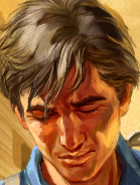King's Mountain Poem by David Welch
King's Mountain
It was after the defeat at Camden,
in the fall of 1780,
British Major Patrick Ferguson
sought to exploit Britain's victory.
To secure South Carolina's countryside,
he marched his loyalist forces forward,
threatened the men beyond Appalachia,
said he would lay waste with fire and sword.
He believe that with Gates fast in retreat,
resistance in the south would soon fall,
but he'd not met the Overmountain Men,
and did not understand them at all.
Living on the edge of the wilderness,
they were a hardened and seasoned crew,
who had been fighting Indians for years,
and had defeated more than a few.
Isaac Shelby and John Sevier,
fresh from a small win at Musgrove's Mill,
were not going to just let this threat pass,
that would have been much too bitter a pill.
A call was sent out for all to muster
at a place known as the Sycamore Shoals,
fourteen hundred militiamen afoot,
they all started off after their goal.
Word was that this Major Ferguson
marched fast to rejoin the British man force,
against such an army they couldn't stand,
so they hurriedly traced Ferguson's course.
Even put nine hundred men on horseback
so their enemy would not slip on by,
leaving five hundred patriots behind,
across that fair country did they fly.
Ferguson knew he was being pursued,
and made his camp atop of a low peak,
three hundred feet high with broad wooded slopes,
it seemed a secure place to rest and sleep.
So strong did he feel his position was
that he proclaimed, to calm all his men's fears,
atop the hill they could hold forever,
no force on Earth would move him form here.
Such confidence had the man in his strength
that his lookouts sadly dropped the ball,
at three o'clock the patriots attacked,
the British men had not seen them at all.
The militiamen surrounded the hill,
following a loose and pre-approved plan,
moving and shooting like the Indians,
never out in the open would they stand.
To make things worse, the British forces had
muskets, best suited for open fields,
patriots carrier Kentucky rifles,
at two hundred yards their danger was real.
And though the rifles were slower to load,
the Overmountain Men made use of trees,
concealing themselves from counterfire
in places that the British couldn't see.
With countless snipers popping out to shoot,
all the loyalists there atop the hill
knew that something had to be done quickly,
so many had already been killed.
Ferguson ordered a bayonet charge,
old steel glinting as his men pushed down,
the patriots scattered, running away,
it seemed the British would hold the ground…
But as soon as the men returned to the line,
the Americans moved back in again,
two more charges had the same damn result,
flashing bayonets could not break these men.
As they kept shooting, chipping away,
the loyalists knew that things were dire,
too many of their brethren lay dead,
cut down by the frontiersman's fire.
These patriots were men who shot for food,
missing for them meant their families might starve,
the killed so many that white flags went up,
leaving Ferguson rather alarmed.
He rode through, hacking the flags with his sword,
calling on his men for courage and grit,
but just then the patriots spotted his horse,
charged up and shot Ferguson off of it.
An American then grabbed the Major,
and dragged him behind the patriot lines,
it was here that Ferguson did something
seen by all as remarkably malign.
When asked to surrender by a soldier,
he pulled his pistol and shot the man dead.
The patriots all fired on the man,
until his chest had become mostly lead.
The remaining loyalists struck their flag,
and they came forth to try to surrender,
but the patriots remembers Waxhaws,
there was real danger of massacre.
They remember that the British there had
cut down men who had thrown up their hands,
but William Campbell, and John Sevier,
would not allow such dishonor to stand.
They accepted the British surrender,
near three hundred loyalists had been killed,
to only twenty-eight patriot dead,
with great relief the southern states were filled.
Major Ferguson's words proved prophetic,
though probably not in his desired way,
no force could move him from King's Mountain,
he lies under its slopes to this day.
This poem has not been translated into any other language yet.
I would like to translate this poem
Thanks. Glad you enjoyed it.